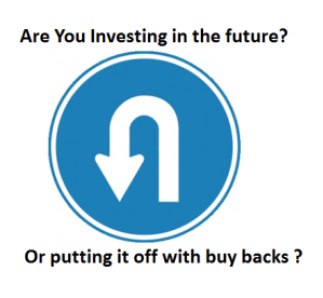Is all investment about the future?
 I was reading an article by Doug Collins on the “three wishes for the innovation practitioner for 2015” where he points out “2014 was the year for share buybacks and dividends“.
I was reading an article by Doug Collins on the “three wishes for the innovation practitioner for 2015” where he points out “2014 was the year for share buybacks and dividends“.
An article from Bloomberg reports that companies in the Standard & Poor’s 500 Index are “poised to spend $914 billion on share buybacks and dividends this year, or about 95 percent of earnings.”
95% of earnings – Doug rightly says “wow” and offers a thoughtful set of observations
“Every organization that enjoys free cash flow makes a decision on where to allocate that resource. If the opportunity available to the organization meets or exceeds the hurdle rate—the desired, expected rate of return—then, in theory, they invest in that opportunity. If not, then no: the organization returns the cash to the investors. Of course, earnings come after investments the organization makes in innovation—research & development expenses, for example. Many do invest a lot in R&D”
He then remarks “And yet…..and yet” ….

